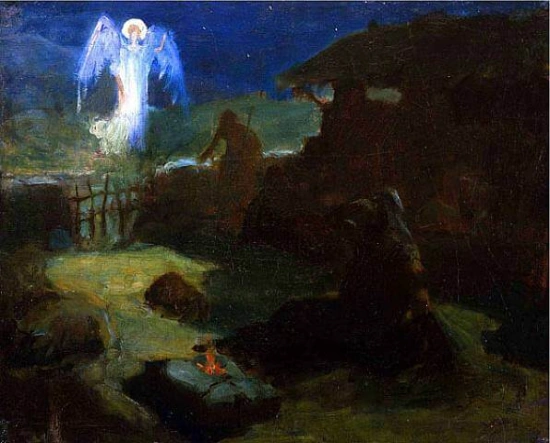19. XIX. The truths which are called the truths of faith, and the kinds of good which are called those of love, are increased to an indescribable extent in the internal senses, and so in the heavens.
What the natural sense is like without the spiritual and celestial senses, and these without the natural sense.
The reason is that natural things are the effects coming from spiritual things, and spiritual things are the effects coming from celestial things. An effect is composed of so many elements invisible to the eye; these are causes so numerous that they could go on being counted for ever. An effect is gross, and the cause enters into every part of the effect, and is so to speak the common factor composing it, the particular details of which are completely outside 1
the range of the eye's vision.
[2] A cause may be compared to a tree, which to the eye appears to have luxuriant branches, leaves and fruits; all of these are effects. But if you could observe a branch inside, down to its filaments, or a leaf down to its fibres, or a fruit down to its every detail, which are too small to see, and a seed with all its details too small to see, from which the tree and all its parts come, you would see what countless and indescribable secrets lie hidden beyond the range of the eyes. Once before an audience of angels a flower was opened up to its inner or spiritual components; and on seeing these they said it was as if a whole park were contained in it, made up of indescribable parts.
[3] Another comparison might be with the human body with all its limbs and organs visible, as compared with its inner structure. Here there are so many organic forms, connected and making a single whole entirely by the secrets of all the sciences, 2
so that you might say that the secrets of all the sciences have contributed to it, such as physics, chemistry, mechanics, geometry, acoustics, optics. These scientific secrets can never be fully investigated, because they cannot be grasped. This is what the interior is compared to the exterior, or the spiritual as compared to the natural, and the celestial as compared to the spiritual. The natural regarded in itself is nothing but the external form, what is called the effect, of spiritual things; and the spiritual is the external form, what is called the effect, of celestial things. Everything spiritual comes from the celestial, and everything natural from the spiritual.
This makes it clear how we must understand the statement that truth is the form of the good, and that good has its quality in truths; because good in them possesses a form, and in the absence of a form quality ceases to exist. Also that truth arises from good, as from its living cause; and if you take good away from truths, this is like taking the kernel out of an almond, and truth is like its shell. Or it is as if you took away the flesh from a fruit, leaving only the skin. Truth therefore without good is turned into something imaginary, outwardly looking the same, but empty inside. So too is the natural without the spiritual, and also the spiritual without the celestial.
[4] Since the spiritual contains indescribable things not visible in the natural, and the celestial contains countless things [not visible in the spiritual], 3
the natural, spiritual and celestial senses cannot be described by comparing one with another. Thus one comes after another, like knowledge, intelligence and wisdom. People on earth therefore, being in natural light, are called by angels knowledgeable, but the angels of the Lord's spiritual kingdom are called intelligent, and the angels of the Lord's celestial kingdom are called wise.
[5] The Word in its literal sense can be compared to a tree, surrounded by an undamaged and flourishing rind or bark; and the spiritual sense can be compared to its being fed by various juices and essences, some rising from the ground, others absorbed from the air or ether by means of the sun's heat and light. If the literal sense stood alone, and was not accompanied by the spiritual and celestial senses, it would be like a tree with no sap, or rather, the bark alone with no wood inside. But together with those senses it is like a tree in all its perfection. In it too all the sap passes from the root by way of the rind or cortex. If therefore it is taken away, the tree withers. Such would be the spiritual sense of the Word, if deprived of its natural sense.
Notas a pie de página:







